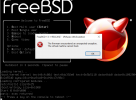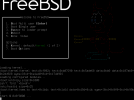I can say I never had problems in managing FreeBSD UEFI boot. I converted a lot of machines from old standard BIOS legacy boot to UEFI boot without any glitch and/or problem but this 13.1-RELEASE (i386) virtual install.
Google was my friend discovering someone had the same problem long ago with my same problem and even a bug tracker was opened and apparently solved in FreeBSD bug tracker.
https://bugs.freebsd.org/bugzilla/show_bug.cgi?id=250580
No problem creating and configuring the EFI partition with the powerfull loader.efi, then when it is time to load the kernel the virtual machine crash with the VMware message: "The Firmware Encountered an unexpected exception. The virtual machine cannot boot."
Reading the Dmesg printed by the virtual install before the halt, I could think there is something wrong with the machine kernel itself considering it has a Panic: exec return message prior to the VMware halt.
I also have to say I have no problem with x86_64 migrated hosts, just this i386 install.
What should I look for in the machine kernel/loader.conf or what?
I can still boot the machine becouse I just add an efi partition so I'm able to boot the machine in boot legacy (original untouched freebsd-boot partition) and UEFI mod (this like I explained do not boot).
Google was my friend discovering someone had the same problem long ago with my same problem and even a bug tracker was opened and apparently solved in FreeBSD bug tracker.
https://bugs.freebsd.org/bugzilla/show_bug.cgi?id=250580
No problem creating and configuring the EFI partition with the powerfull loader.efi, then when it is time to load the kernel the virtual machine crash with the VMware message: "The Firmware Encountered an unexpected exception. The virtual machine cannot boot."
Reading the Dmesg printed by the virtual install before the halt, I could think there is something wrong with the machine kernel itself considering it has a Panic: exec return message prior to the VMware halt.
I also have to say I have no problem with x86_64 migrated hosts, just this i386 install.
What should I look for in the machine kernel/loader.conf or what?
I can still boot the machine becouse I just add an efi partition so I'm able to boot the machine in boot legacy (original untouched freebsd-boot partition) and UEFI mod (this like I explained do not boot).



